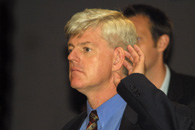Grit gab
 Deputy Prime Minister and Finance Minister John Manley
Deputy Prime Minister and Finance Minister John ManleyOwen Egan |
|
He discussed the possibility of a new health tax, he concurred with Jean Chrétien on the link between poverty and terrorism, he even made a comment about taking the reins of government by force, but the Deputy Prime Minister's most recent visit to McGill was noted in the press for one thing only.
"Manley Calls for End of Monarchy" screamed the headlines on Saturday. Well, yes, he did that too.
John Manley, Deputy Prime Minister and Finance Minister, widely seen as the man to whom Chrétien would most like to hand the keys to 24 Sussex Drive, spoke at McGill on October 4 at the invitation of Liberal McGill.
The overflow crowd in Leacock 232 heard him speak about what he believes to be Canadian values--from the courage of Terry Fox to the generosity of Newfoundlanders who opened their homes to stranded air passengers after the terrorist attacks of September 11, 2001.
"We didn't do that so George W. Bush would mention us in a speech," said Manley, adding, to appreciative laughter, "Although it would have been nice if he had."
Much of his speech lauded his government's record, and described kinds of decisions Canada needs to make to maintain our relevance on the international scene.
He related a story about how he recently visited the editorial offices of the Wall Street Journal, effectively to brag about Canada's impressive gains in deficit fighting and debt reduction--Manley believes we deserve to be called a "Northern Tiger" for our economic successes.
"Right outside the window was ground zero. They listened to my pitch, and the first thing they said was 'That's great. Now we want to talk about Iraq.' That's not in the past for them —it's very much in the here and now. And we have to be aware of that."
Manley warned that Canada has to be part of the solution, dealing from a position of strength. Our international reputation will help us in this regard. He told a story about his recent trip to Afghanistan, where although the war is over, he still needed to be escorted by dozens of troops ("I had 24 armed men with me--if ever I wanted to take over a government, that was the time"). While there, he spoke to an Afghani widow, who had survived for a decade on rations supplied by a Canadian relief group that was operating in Afghanistan years before the U.S. bombing began.
"She said, 'When you go back to Canada, will you thank them, because Canada allowed my family to survive,'" he said, obviously still moved by the experience.
"I'm very proud of that--Canada is known as a country that helped them in their time of need."
Yet we need to do more. Echoing his party leader's controversial sentiments, Manley said that poverty is a contributing factor to terrorism.
"If we don't admit that cesspools of desperate poverty are breeding grounds for people who have nothing to lose, and are therefore prepared to do desperate things, then we will never root out terrorism," he said.
"If we force people to live with no dignity, then we will have to face the consequences."
After his speech, Manley answered questions about a possible new health tax. He denied the Liberals were looking at one, and added that the government is awaiting the Romanow Report. Another audience member questioned him on the so-called "Democratic Deficit" that Manley's former cabinet colleague and current leadership rival Paul Martin has adopted as a campaign plank.
"I think there is some institutional reform that is overdue in Canada," said Manley cautiously.
Other students asked him about such hot-button issues as free trade's potential impact on education and health care, and Canada's position on war with Iraq.
Manley's controversial comments on the Monarchy's future in Canada came in a media scrum, after most of the audience had departed.
"Personally, I would prefer it if we had a uniquely Canadian institution after Queen Elizabeth," he said. The Queen--currently visiting Canada--was not available for comment.

